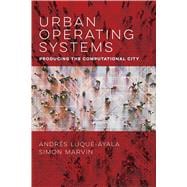Luque-Ayala and Marvin argue that in order to understand how digital technologies transform and shape the city, it is necessary to analyze the underlying computational logics themselves. Drawing on fieldwork that stretches across eleven cities in American, European, and Asian contexts, they investigate how digital products, services, and ecosystems are reshaping the ways in which the city is imagined, known, and governed. They discuss the reconstitution of the contemporary city through digital technologies, practices, and techniques, including data-driven governance, predictive analytics, digital mapping, urban sensing, digitally enabled control rooms, civic hacking, and open data narratives. Focusing on the relationship between the emerging operating systems of the city and their traditional infrastructures, they shed light on the political implications of using computer technologies to understand and generate new urban spaces and flows.








